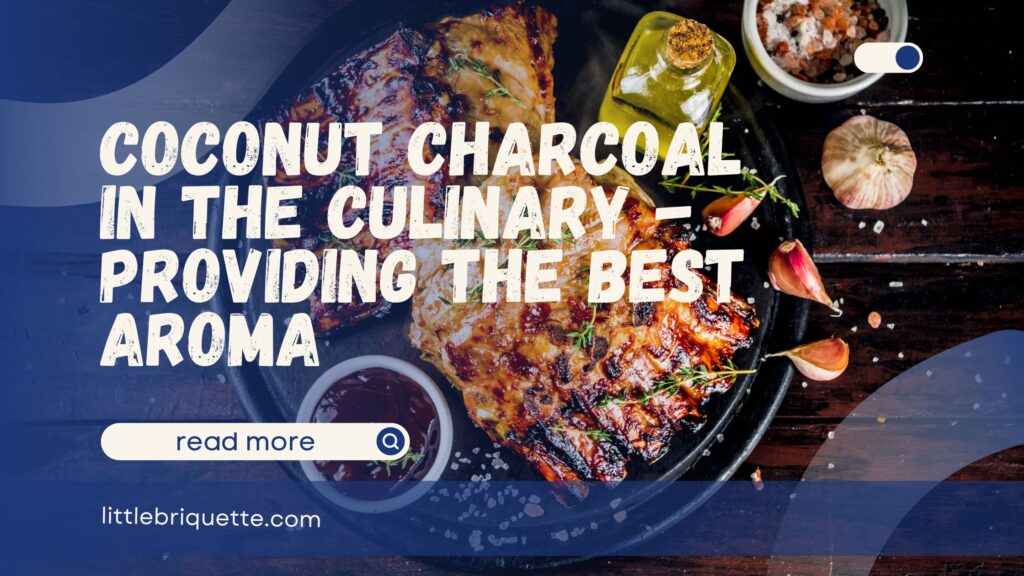Coconut charcoal is a type of fuel produced using coconut shells as raw material. This fuel has various uses, including in shisha smoking, beauty treatments, medicine, and more. Additionally, many advantages coconut charcoal in the culinary world because it provides a distinctive aroma without causing a pungent smell. The following is a detailed explanation of coconut charcoal’s role in the culinary world.
The Uniqueness and Popularity of Coconut Charcoal in the Culinary
Coconut charcoal is becoming increasingly popular in the culinary world due to its various unique qualities and advantages:
Distinctive Aroma

Coconut charcoal produces a subtle and unique aroma that imparts a special touch to dishes in a way that other types of charcoal cannot. This aroma is characterized by its smooth and slightly sweet notes, which enhance the flavor and complexity of the food. When used in cooking, the aroma of coconut charcoal can enrich the gastronomic experience by adding a deeper, more enjoyable nuance, elevating the taste of the food in an elegant and distinct manner.
Purity and Quality

Coconut charcoal often has a higher purity compared to traditional charcoal made from wood or other materials, thanks to its more controlled production process and raw materials free from chemicals. The production of coconut charcoal involves heating coconut shells in an oxygen-free environment, which results in charcoal with a high level of activated carbon and free from contaminants. This ensures that coconut charcoal is not only of high quality but also produces clean and efficient combustion, making it an ideal choice for those who prioritize quality and purity in cooking.
Stable Heat Levels

Coconut charcoal is popular for its ability to produce stable and consistent heat, making it an ideal choice for cooking techniques such as grilling, BBQ, and tandoori. With its uniform density and composition, this fuel maintains an even and effective temperature. This quality not only improves the final outcome of dishes by avoiding temperature fluctuations that can damage food but also provides better control during the cooking process, allowing chefs to achieve the desired level of deliciousness.
Innovation in the Culinary

Modern chefs and restaurants are increasingly adopting coconut charcoal to create innovative and appealing dishes by utilizing its distinctive aroma in food presentation. The use of coconut charcoal allows for the creation of unique “smoked” or “charred” effects, adding extra flavor and aesthetic dimensions to dishes. By leveraging coconut charcoal, chefs can explore cooking techniques that create new gastronomic sensations, enriching the culinary experience with captivating aromas and flavors that differ from traditional methods.
Environmentally Friendly
Coconut charcoal is an environmentally friendly choice in the culinary world due to its sustainable production process and use of renewable resources. Made from coconut shells, which are by-products of the coconut industry, it reduces waste by repurposing what would otherwise be discarded. Unlike traditional wood charcoal, which requires deforestation, the production of coconut charcoal does not involve cutting down trees, making it a more eco-conscious alternative. Additionally, the manufacturing process of coconut charcoal is often cleaner and involves fewer pollutants, contributing to a lower ecological footprint. By choosing coconut charcoal, chefs and consumers support environmentally responsible practices while enjoying high-quality cooking fuel.
The Role of Charcoal in the Culinary World
In traditional cooking across various cultures, coconut charcoal has long been used to impart a distinctive flavor and deep aroma. In many Asian countries, such as Indonesia, the Philippines, and India, coconut charcoal is employed in cooking techniques like grilling and tandoori. This type of charcoal provides even heat and a “smoky” characteristic that adds depth to dishes such as satay, kebabs, and tandoori bread. Additionally, coconut charcoal is used in traditional smoking processes, where its aroma infuses the food, enhancing flavor profiles and giving dishes an authentic touch.
In the realm of contemporary cuisine, coconut charcoal has been integrated into more innovative cooking techniques and presentations. Modern restaurants and creative chefs use coconut charcoal not only for cooking but also as an aesthetic element in food presentation. For example, coconut charcoal is utilized in sous-vide cooking to add a “smoked” aroma to dishes in a controlled and elegant manner. It has also become a key component in creating unique gourmet dishes, where the aroma and visual effects of coconut charcoal enhance the culinary experience, adding an intriguing and sophisticated dimension.
Benefits of Using Coconut Charcoal in the Culinary World
Coconut charcoal, known as an alternative fuel source from renewable energy utilizing coconut shell waste, offers several advantages in cooking processes. These benefits are realized when using high-quality coconut charcoal as a cooking fuel. High-quality charcoal that is free from chemical contamination provides a distinctive cooking experience and flavor without any unpleasant odors.
Health Advantages
Coconut charcoal has health benefits because it is typically produced without additional chemicals, reducing the risk of contamination in food. The production process of coconut charcoal also eliminates harmful substances often found in conventional charcoal, such as excessive carbonization or chemical residues. Additionally, coconut charcoal is often considered cleaner and more natural, making it safer for use in cooking techniques that affect food aroma and flavor.
Cooking Performance
Coconut charcoal excels in terms of heat and stability. Due to its high carbon density, coconut charcoal produces more consistent and stable heat compared to other types of charcoal. This allows for better temperature control during cooking processes like grilling and BBQ, contributing to more even and high-quality results. Coconut charcoal also has a long burn time, reducing the need for frequent replenishment and facilitating cooking processes that require extended periods.
Sustainability of Coconut Charcoal in the Culinary
Coconut charcoal supports environmentally friendly cooking practices by utilizing raw materials that are by-products of the coconut industry. Using coconut shells, which are typically discarded, reduces waste and makes more efficient use of resources. Furthermore, the production of coconut charcoal tends to be more eco-friendly because it does not require deforestation, unlike wood charcoal production. Thus, coconut charcoal contributes to sustainability and reduces the ecological impact of traditional fuel sources.
Top Coconut Charcoal Producers
That’s a detailed look at the growing popularity of coconut charcoal in the culinary world compared to traditional types of charcoal. However, it’s important to note that the quality of the charcoal used will significantly impact the cooking process. Therefore, selecting high-quality charcoal as a cooking fuel is crucial.
You can find affordable and high-quality coconut charcoal at Little Briquette. Little Briquette uses Sumatra coconuts from its own plantations to produce coconut charcoal free from chemical contaminants. You can purchase coconut charcoal in bulk through this number.

